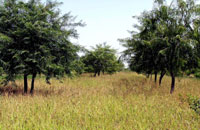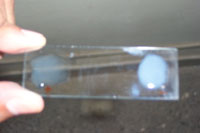|
|
A PUBLICATION OF THE INDIAN SOCIETY FOR SHEEP AND GOAT PRODUCTION AND UTILIZATION
(ISSGPU)
ISSGPU NEWSLETTER -
|
|
|
 Cultivation of food/fodder crops is always at the verge of risk in semi-arid and arid areas due to unpredictable, meagre and
erratic distribution of rainfall. Fruit crops, which are permanent
establishment, not only reduce the climatic risk but also are good remunerative one. Cultivation of food/fodder crops is always at the verge of risk in semi-arid and arid areas due to unpredictable, meagre and
erratic distribution of rainfall. Fruit crops, which are permanent
establishment, not only reduce the climatic risk but also are good remunerative one.
If fruit tree species are planted along with perennial grasses, due to close and packed anchoring of soil, it is a good soil
and water conservation measure particularly on sloppy degraded erosion prone lands. Prominent fruit tree of the dry areas are
aonla (Emblica officinalis) and ber (Zizyphus mauritiana) which can be planted in the configuration of 8 X 8 m2 (for
aonla) and 6 X 6 m2 (for ber) in agri-horti-pasture system. The improved grasses viz. Anjan (Cenchrus ciliaris), Dhaman (Cenchrus
setigerus) and Sewan (Lasiurus sindicus) can be taken in agri-horti-pasture system in dry areas. Such system fulfills the
fodder need of the farmer along with cash returns in the form of fruits.
Contributed by Drs J.S. Mann and S.C. Sharma, CSWRI, Avikanagar
|
|
|
|
The increasing incidences of residues of pesticide, herbicide, antibiotics and hormone in the meat and meat product in the
recent years are of a great concern for ensuring food safety and protecting human health. Pesticides are used during the
production, storage, transport, and distribution and processing of agricultural commodities for control of pest or unwanted
plant species or spraying on the body of animal for control of external parasites. Pesticides enter animal body and are
deposited in the adipose tissue. As the concentration in the fatty tissue exceeds a threshold level, the excess residues are
translocated into the lactating glands of animals and are secreted in the milk. Other route is absorption of pesticides from
skin or digestive tract and deposition in the adipose tissue. Whenever the animal mobilizes their body reserve to support
growth or lactation, these pesticides enter blood circulation and secreted in the milk. Pesticides are not able to generate
immune response in body. But when they bind with certain proteins, they become immunogenic and initiate the immune response
against the body proteins, leading to generation of immunity against itself. It destructs the self-tissue and become fatal.
Organophosphate pesticides cause immuno-suppression, neuropathic and hepetopathic effects in human being. The residues of
antibiotics are known to cause allergic reactions in human being. The intake of low doses of antibiotics residue by the
consumers from animal produce gradually replace the sensitive gut micro flora by resistant form. Sex hormones in the recent
years are also used in fattening of sheep. The eating of meat containing unacceptably higher levels of hormones cause many
side effects in people, including breast enlargement and ovarian cysts. Rearing of sheep under organic farming avoids the
adverse effect of hazardous chemicals on animals and health of human beings. This appeares to be the realistic approach for
ensuring safe meat and milk for human consumption. The production of an organic sheep would, therefore, eliminate the need
for routine chemical treatments such as drenching or dipping for internal and external parasites, fly dressings, antibiotics,
vaccines against many diseases, growth promoters for enhancing growth and mutton production, feed additives, hormones and
rumen manipulators, use of synthetic fertilizers, pesticides, insecticides and other chemicals in pasture.
Contributed by Drs V. K. Singh, A. K. Shinde and R.. Kumar, CSWRI, Avikanagar |
|
|
|
 The CONTAGIOUS CAPRINE PLEUROPNEUMONIA (C.C.P.P.) is one of the important diseases prevalent in caprine population in India.
This disease is enlisted in “TYPE – B” in O.I.E. classification. In our country the main etiological agent of CCPP is
Mycoplasma mycoides sub sp. capri (M. capri). The mortality rate in goats due to CCPP ranges up to 20.35 per cent. In goats, The CONTAGIOUS CAPRINE PLEUROPNEUMONIA (C.C.P.P.) is one of the important diseases prevalent in caprine population in India.
This disease is enlisted in “TYPE – B” in O.I.E. classification. In our country the main etiological agent of CCPP is
Mycoplasma mycoides sub sp. capri (M. capri). The mortality rate in goats due to CCPP ranges up to 20.35 per cent. In goats,
beside ARTHRITIS AND CONJUNCTIVITIS, the organism mainly causes PNEUMONIA /
PLEUROPNEUMONIA. To overcome the disease, an early and rapid diagnostic is needed which can be applied directly at field level. A LATEX ANTIGEN using LOCAL M. capri
isolate, was developed by Drs. Rajneesh Rana, Ashok Kumar, V.K. Gupta and V.S. Vihan of Animal Health Division. The test can
well detect the sero positive cases among goats so that suitable prophylactic/ curative measures can be applied at an early
stage for prevention of morbidity and mortality among goat population.
|
>> Kindly contribute to ISSGPU Newsletter about latest discoveries, news on sheep, goat and rabbit.
>> You are requested to kindly send your e-mail addresses and phone numbers
Compiled and edited by:
V.P.Maurya
Dr. Davendra Kumar
S. C. Sharma
|
Layout Setting:
M.L. Jangid
B.L.Sharma
|
Published By
ISSGPU, CSWRI
Avikanagar304501 Via:Jaipur (Raj.)
|
|







